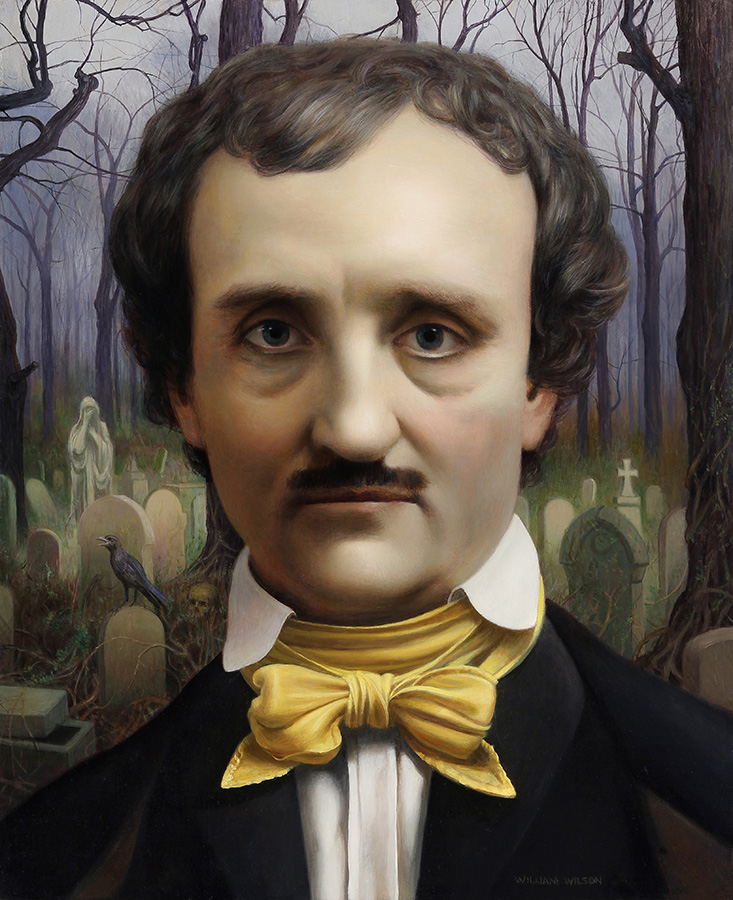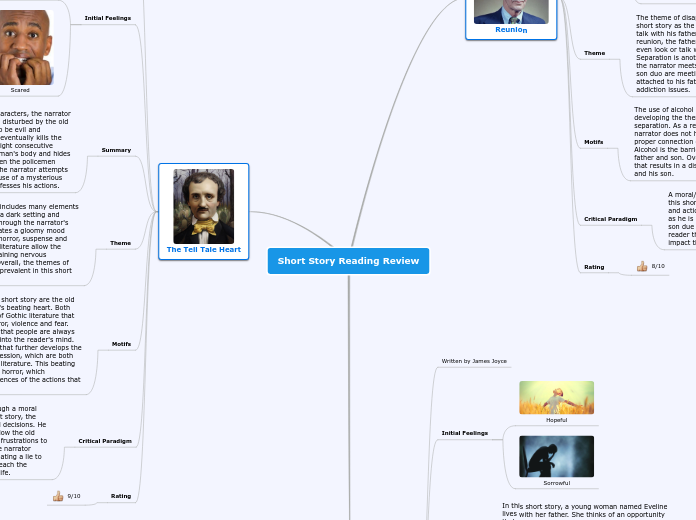Short Story Reading Review

Reunion
Written by John Cheever
Initial Feelings

Disappointment

Sadness
Summary
In this short story, the narrator is a young man named Charlie visiting his father who he has not seen for an extended period of time. The narrator and the father go out and eat at different restaurants, however, the father’s arrogance and rude behavior towards the waiters results in the father and son leaving the restaurant to go to the next. At each restaurant, the father does not talk to his son or ask about his well being, but is rather focused on asking the waiter for alcohol in a rude manner. At the end, the son and father never have a conversation with one another.
Theme
The theme of disappointment is presented in this short story as the narrator never has a chance to talk with his father. Despite looking forward to their reunion, the father is too addicted with alcohol to even look or talk with the people in his life. Separation is another theme that is revealed when the narrator meets with his father. While the father-son duo are meeting, the narrator does not feel attached to his father because of his father's addiction issues.
Motifs
The use of alcohol as a motif is effective in developing the themes of disappointment and separation. As a result of his father's alcoholism, the narrator does not have the opportunity to establish a proper connection or relationship with his father. Alcohol is the barrier preventing a bond between the father and son. Overall, it is the father's addiction that results in a distant relationship between him and his son.
Critical Paradigm
A moral/philosophical lense can be used to examine
this short story. The author challenges the choices and actions that the father makes in this short story as he is unable establish a close relationship with his son due to his addiction. This short story teaches the reader the consequences of alcoholism and the impact that it creates on a family.
Rating
8/10
_-_James_Joyce_amb_bigoti_i_ulleres.jpg/374px-La_Trieste_de_Magris_al_CCCB_(37)_-_James_Joyce_amb_bigoti_i_ulleres.jpg)
Eveline
Written by James Joyce
Initial Feelings

Hopeful

Sorrowful
Summary
In this short story, a young woman named Eveline lives with her father. She thinks of an opportunity that awaits her if she marries her lover, Frank, and starts a new life in Argentina. However, since her mother is dead, Eveline is needed to take care of household chores while working multiple jobs to provide for her family. Despite being abused by her father, Eveline chooses not to board the ship with Frank, but to continue living the life that she currently is in.
Theme
The theme of reflection and nostalgia are present in this short story. While currently living in a sad, hopeless life, Eveline reflects on her past life where her family lived happily in Ireland. Eveline reflects and thinks of a hopeful future and the possibilities of her life if she leaves Dublin to marry her lover Frank. Another theme is the struggle of women when choosing between family and their desired life. While Eveline may desire for a better, hopeful life with Frank, she must obey her family and take on the household chores and domestic work.
Motifs
The motifs used in this story story include food and the windows. The food represents the happiness and joys that the people of Dublin once experienced. This develops the theme of reflection of the past when Eveline reminisces her past life when everyone surrounding her was happy. The windows represent the barrier between Eveline's current reality and the future that she is awaiting. This clear window is also a barrier between family life and the outside world that Eveline cannot escape.
Critical Paradigm
This short story can be examined through the gender roles critique. Throughout this short story, it is evident that the protagonist, Eveline, is oppressed by her father because she is a female. Eveline's freedom and personal choices are restricted as she is responsible for taking care of her family chores and housework. As a result, Eveline cannot leave her current reality to live a new life because of the gender roles given to her.
Rating
9/10

The Tell Tale Heart
Written by Edgar Allan Poe
Initial Feelings

Fearful

Scared
Summary
This short story features two characters, the narrator and an old man. The narrator is disturbed by the old man's eye which he describes to be evil and extremely creepy. The narrator eventually kills the old man after stalking him for eight consecutive nights. He dismembers the old man's body and hides his remains under the floor. When the policemen arrive to the old man's house, the narrator attempts to cover up his crime, but because of a mysterious heart beat sound, he finally confesses his actions.
Theme
The author, Edgar Allan Poe, includes many elements
of Gothic literature including a dark setting and extreme violence displayed through the narrator's actions. The dark setting creates a gloomy mood which supports the genre of horror, suspense and fear. The elements of Gothic literature allow the reader to feel fear while remaining nervous throughout the short story. Overall, the themes of fear, violence and horror are prevalent in this short story.
Motifs
Two motifs presented in this short story are the old man's eyes and the old man's beating heart. Both these objects are elements of Gothic literature that help support the idea of horror, violence and fear. The eyes represent the idea that people are always watched, thus instilling fear into the reader's mind. The beating heart is a motif that further develops the themes of violence and aggression, which are both common elements of Gothic literature. This beating heart is used as an object of horror, which symbolises that the consequences of the actions that people choose to make.
Critical Paradigm
This short story can be examined through a moral
critical paradigm. Throughout this short story, the narrator struggles with making rational decisions. He is influenced by his evil thoughts to follow the old man, until he eventually unleashes his frustrations to kill the old man. After this decision, the narrator attempts to cover up his actions by creating a lie to the police officers. These choices can teach the reader the lesson of what not to do in life.
Rating
9/10
